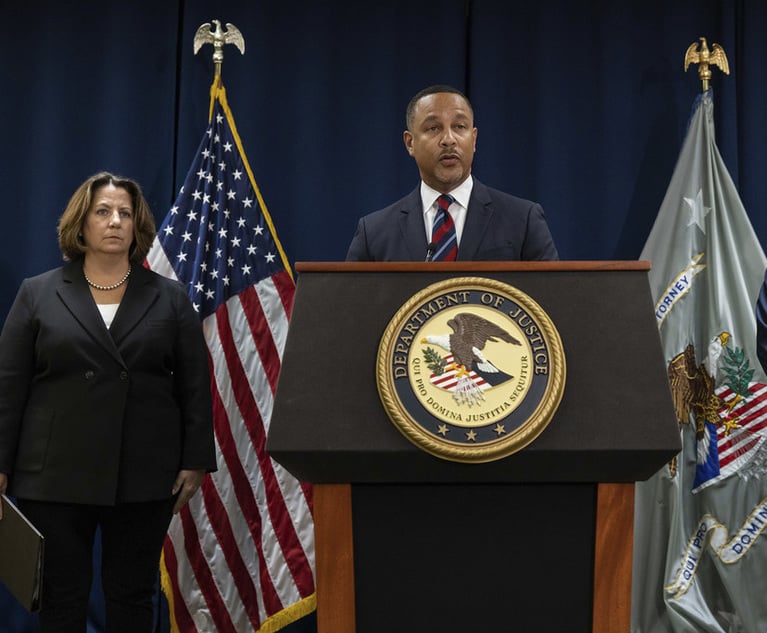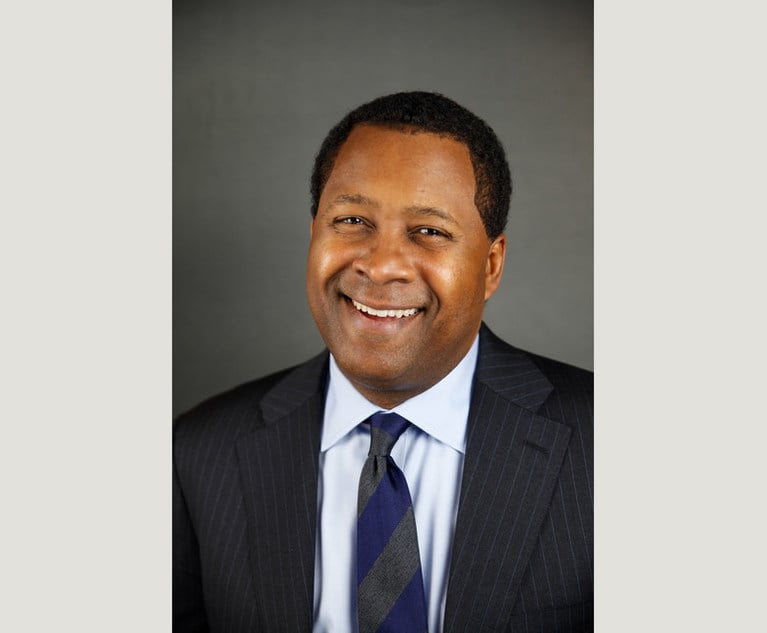Compliance Hot Spots: Investors As Potential Tipsters | 4th Circuit Confronts Search Warrant Fairness | CFTC Sued Over Settlement Secrecy | Who Got the Work | White-Collar Moves
The SEC announces new whistleblower charges, the 4th Circuit has strong words about the feds searching a law firm, and a firm is suing the CFTC over a secrecy provision in a recent settlement -- welcome to Compliance Hot Spots! Thanks for reading.
November 05, 2019 at 09:00 PM
9 minute read
Welcome to Compliance Hot Spots. Lots to unpack this week, including a spotlight on the SEC's latest whistleblower charges, a warning from the 4th Circuit about investigatory fairness, and much more. Scroll down for Who Got the Work and all the notable moves. Tips, feedback and general thoughts on your practices are always appreciated. I'm C. Ryan Barber—reach me at [email protected] and 202-828-0315, or follow me on Twitter @cryanbarber. Thanks for reading!

New SEC Whistleblower Charges
The U.S. Securities and Exchange Commission this week charged a company and its chief executive with unlawfully trying to stop investors from reporting misconduct to federal regulators, an enforcement action that expands on whistleblower protection efforts that have been largely centered on employees.
In an amended complaint, filed in Manhattan federal district court, the SEC tacked on charges against the online auction portal Collectors Cafe and its CEO Mykalai Kontilai, who had been accused of making a fraudulent securities offering and misappropriating investors' money.
The SEC alleged that Collectors Cafe conditioned the return of money to investors who signed agreements that they would not report potential misconduct to the commission or other government agencies.
"In one of these instances," the SEC said in the amended lawsuit, "Collectors Café and Kontilai even went so far as to file a lawsuit claiming that the victims breached the confidentiality provision by communicating with SEC staff about possible securities law violations."
Kontiliai's defense lawyer, Hughes Hubbard & Reed senior counsel Edward Little, declined to comment. Collectors Cafe is represented by Gage Spencer & Fleming partner William Fleming, who also declined to comment on the new charges.
Jane Norberg, the chief of the SEC's whistleblower office, said in a statement: "The SEC's whistleblower protections broadly protect not just employees, but anyone who seeks to report potential securities law violations to the commission."

US Appeals Court Warns Prosecutors About Fairness in Search Warrant Dispute
Prosecutors and white-collar defense lawyers in the Fourth Circuit undoubtedly took note of a new published ruling confronting a circumstance in which the government hit a Baltimore law firm with a search warrant.
The appeals panel—Chief Judge Roger Gregory (above), with judges Robert King and Alison Rushing—said the use of a government "filter team" was improper, and that a federal magistrate judge should have had sole eyes on the material federal investigators seized from the firm. The court said the use of the filter team, which had been approved by a magistrate, "contravenes foundational principles that protect attorney-client relationships."
King wrote the ruling for the panel. Several other observations from the opinion, which the government could decide to further challenge:
>> "The harm to the law firm and its clients that will be caused by continuing the filter team's review outweighs any harm to the government that might result from the magistrate judge conducting the privilege review of the seized materials. Indeed, we discern no harm to the government in barring the filter team from rummaging through law firm materials that are unrelated to the underlying investigations."
>> "The government maintains that the magistrate judge's review of the seized materials will unduly delay the government's investigations. And the government claims that it has an interest in efficiently investigating criminal wrongdoing. Although efficient criminal investigations are certainly desirable, we are not persuaded that the claimed delay in its investigations weighs in the government's favor."
>> "Due to the appearances of unfairness caused by the filter team, and in view of the other problems associated with the filter team, it is surprising that the government has so vigorously supported it. We simply observe that prosecutors have a responsibility to not only see that justice is done, but to also ensure that justice appears to be done."

Who Got the Work
>> Teams from K&L Gates and Covington & Burling have advised ByteDance Technology Co.—owner of the social platform TikTok—on various content and policy matters. Reuters first reported last week that "the U.S. government has launched a national security review of TikTok owner Beijing ByteDance Technology Co's $1 billion acquisition of U.S. social media app Musical.ly."
>> Lawyers from Kobre & Kim, the Christie Law Firm and Lowenstein Sandler advised Jho Low, "the businessman-turned-fugitive accused of masterminding a multibillion-dollar fraud involving Malaysia's sovereign-wealth fund," the WSJ reports. The U.S. Justice Department said it has reached a deal with Low to recover more than $700 million in assets allegedly tied to corruption involving that fund. Deputy Chief Woo S. Lee and trial attorneys Kyle Freeny, Joshua Sohn, Barbara Levy and Jonathan Baum of the Justice Department's money laundering and asset recovery section were on the government's team. Read the consent judgment of forfeiture here.
>> Consovoy McCarthy PLLC is representing Institutional Shareholder Services Inc. in a new suit against the U.S. Securities and Exchange Commission. The plaintiffs team include Jeffrey Harris, John Connolly and Steven Begakis. "The Proxy Adviser Release is unlawful for several independent reasons and must be enjoined and set aside," the lawyers said in their complaint. Financial Times has more here.

Compliance Reading Corner
K Street's Newest Star Built Business on Dubious Claims of Trump Ties. "Every presidency brings a fresh crop of lobbyists to the top of the Washington influence game—associates, friends and others who have the newly minted executive's ear. The wave of ascents after Trump's inauguration was particularly notable because the president lacked long-standing ties to the Republican political establishment. In that vacuum, people who were close to the real estate developer and reality TV star, or who claimed to be, quickly asserted themselves as power brokers. Even so, Esposito's rise stands out—not only because of the questions surrounding the connections he claims but because of his background: He had previously described himself as a Democratic lobbyist." [The Washington Post] Politico has more here: Trump Distances Himself From Lobbyist Claiming Close Ties to Him.
Prosecutors Face Complex Path to Charging Boeing Over 737 MAX. "To bring a successful criminal case against Boeing itself, prosecutors would have to show that executives repeatedly concealed or ignored the 737 MAX's engineering problems, experts said. And there is a larger economic and political component: A corporate indictment and potentially huge sanctions must be balanced against the economic and national-security risks of incapacitating the country's second-biggest defense contractor behind Lockheed Martin Corp." [WSJ]
Kobre & Kim Sues CFTC for Records About Settlement's Gag Order. A new federal public records lawsuit in Manhattan seeks to force a U.S. regulatory agency to open up about why it agreed to a rare gag provision that limited public statements about a closely watched $16 million settlement with major food producers. The law firm Kobre & Kim filed the Freedom of Information Act suit Thursday in U.S. District Court for the Southern District of New York against the U.S. Commodity Futures Trading Commission. [NLJ] Reuters has more here.
Banks Are Using Their Washington Clout to Stomp on the Tech Industry. "Banks are using their long-established relationships on Capitol Hill and in regulatory agencies to undermine a relative newcomer struggling to get traction in Washington: the tech industry." [Politico]
Chief Legal Officer of Anthem Business Unit Discloses His Financial Worth in Senate Document. Matthew Solomson, chief legal officer for Anthem Inc.'s Federal Government Solutions division based in Baltimore, has been nominated for a seat on the U.S. Court of Federal Claims. His disclosure documents show he earned over $500,000 last year at Anthem. [Law.com]

All the New Moves
• Steptoe & Johnson LLP is bringing back a former partner from the U.S. Commodity Futures Trading Commission to co-chair its financial services group, the firm said. Matthew Kulkin will rejoin the firm next month after a two-year stint as director of the CFTC's Division of Swap Dealer and Intermediary Oversight.
• Arnold & Porter said Suneeta Hazra has joined the white-collar defense and complex litigation practices as a partner in Denver. Hazra had spent nearly 20 years in Colorado at the U.S. attorney's office, where she most recently served as chief of the criminal division. Timothy Macdonald, head of the firm's Denver office, said: "Suneeta built a stellar reputation as a top trial lawyer at the U.S. attorney's office."
 • Reed Smith said it has hired Sarah Bruno (at left) as a partner in the firm's global IP, tech and data group in San Francisco. Bruno previously led the privacy, cybersecurity and data protection practice at Arent Fox. Privacy lawyer Casey Perrino, who also was at Arent Fox, joined Reed Smith as an associate. "Sarah's practice spans the full gamut of privacy, cybersecurity and data protection; intellectual property, including global trademarks and copyright; and advertising, marketing and promotions worldwide," said Anthony Diana, co-chair of the firm's IP, tech and data said.
• Reed Smith said it has hired Sarah Bruno (at left) as a partner in the firm's global IP, tech and data group in San Francisco. Bruno previously led the privacy, cybersecurity and data protection practice at Arent Fox. Privacy lawyer Casey Perrino, who also was at Arent Fox, joined Reed Smith as an associate. "Sarah's practice spans the full gamut of privacy, cybersecurity and data protection; intellectual property, including global trademarks and copyright; and advertising, marketing and promotions worldwide," said Anthony Diana, co-chair of the firm's IP, tech and data said.
• Hogan Lovells regulatory partner Yarmela Pavlovic has jumped to Manatt, Phelps & Phillips in San Francisco. Pavlovic's practice focuses on digital health care, and she advises medical device, digital therapeutics, diagnostics and life sciences companies on FDA oversight.
• Hinshaw & Culbertson said Heather McArn has joined as a partner in the consumer financial services practice in New York. McArn was formerly chief of staff and special counsel to Superintendent of the New York State Department of Financial Services.
This content has been archived. It is available through our partners, LexisNexis® and Bloomberg Law.
To view this content, please continue to their sites.
Not a Lexis Subscriber?
Subscribe Now
Not a Bloomberg Law Subscriber?
Subscribe Now
NOT FOR REPRINT
© 2025 ALM Global, LLC, All Rights Reserved. Request academic re-use from www.copyright.com. All other uses, submit a request to [email protected]. For more information visit Asset & Logo Licensing.
You Might Like
View All
Compliance Hot Spots: GOP Eyes ESG as an Antitrust Issue + Another DOJ Crypto Seizure + Sidley Partner Jumps to Main Justice
9 minute read
Compliance Hot Spots: Lessons from Lafarge + Fraud Section Chief Talks Compliance + Cravath Lands FTC Commissioner
11 minute readTrending Stories
- 1No Two Wildfires Alike: Lawyers Take Different Legal Strategies in California
- 2Poop-Themed Dog Toy OK as Parody, but Still Tarnished Jack Daniel’s Brand, Court Says
- 3Meet the New President of NY's Association of Trial Court Jurists
- 4Lawyers' Phones Are Ringing: What Should Employers Do If ICE Raids Their Business?
- 5Freshfields Hires Ex-SEC Corporate Finance Director in Silicon Valley
Who Got The Work
J. Brugh Lower of Gibbons has entered an appearance for industrial equipment supplier Devco Corporation in a pending trademark infringement lawsuit. The suit, accusing the defendant of selling knock-off Graco products, was filed Dec. 18 in New Jersey District Court by Rivkin Radler on behalf of Graco Inc. and Graco Minnesota. The case, assigned to U.S. District Judge Zahid N. Quraishi, is 3:24-cv-11294, Graco Inc. et al v. Devco Corporation.
Who Got The Work
Rebecca Maller-Stein and Kent A. Yalowitz of Arnold & Porter Kaye Scholer have entered their appearances for Hanaco Venture Capital and its executives, Lior Prosor and David Frankel, in a pending securities lawsuit. The action, filed on Dec. 24 in New York Southern District Court by Zell, Aron & Co. on behalf of Goldeneye Advisors, accuses the defendants of negligently and fraudulently managing the plaintiff's $1 million investment. The case, assigned to U.S. District Judge Vernon S. Broderick, is 1:24-cv-09918, Goldeneye Advisors, LLC v. Hanaco Venture Capital, Ltd. et al.
Who Got The Work
Attorneys from A&O Shearman has stepped in as defense counsel for Toronto-Dominion Bank and other defendants in a pending securities class action. The suit, filed Dec. 11 in New York Southern District Court by Bleichmar Fonti & Auld, accuses the defendants of concealing the bank's 'pervasive' deficiencies in regards to its compliance with the Bank Secrecy Act and the quality of its anti-money laundering controls. The case, assigned to U.S. District Judge Arun Subramanian, is 1:24-cv-09445, Gonzalez v. The Toronto-Dominion Bank et al.
Who Got The Work
Crown Castle International, a Pennsylvania company providing shared communications infrastructure, has turned to Luke D. Wolf of Gordon Rees Scully Mansukhani to fend off a pending breach-of-contract lawsuit. The court action, filed Nov. 25 in Michigan Eastern District Court by Hooper Hathaway PC on behalf of The Town Residences LLC, accuses Crown Castle of failing to transfer approximately $30,000 in utility payments from T-Mobile in breach of a roof-top lease and assignment agreement. The case, assigned to U.S. District Judge Susan K. Declercq, is 2:24-cv-13131, The Town Residences LLC v. T-Mobile US, Inc. et al.
Who Got The Work
Wilfred P. Coronato and Daniel M. Schwartz of McCarter & English have stepped in as defense counsel to Electrolux Home Products Inc. in a pending product liability lawsuit. The court action, filed Nov. 26 in New York Eastern District Court by Poulos Lopiccolo PC and Nagel Rice LLP on behalf of David Stern, alleges that the defendant's refrigerators’ drawers and shelving repeatedly break and fall apart within months after purchase. The case, assigned to U.S. District Judge Joan M. Azrack, is 2:24-cv-08204, Stern v. Electrolux Home Products, Inc.
Featured Firms
Law Offices of Gary Martin Hays & Associates, P.C.
(470) 294-1674
Law Offices of Mark E. Salomone
(857) 444-6468
Smith & Hassler
(713) 739-1250










